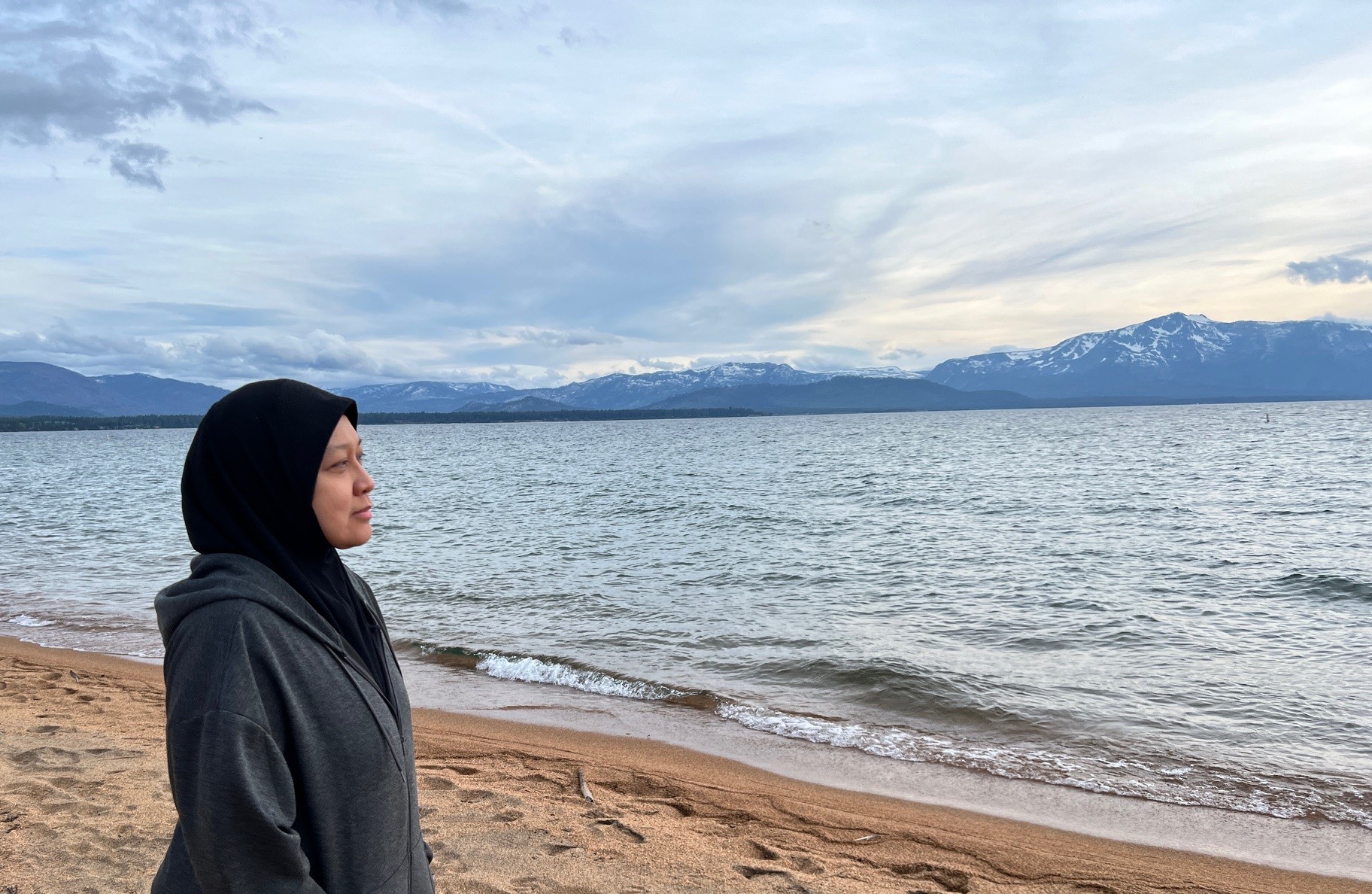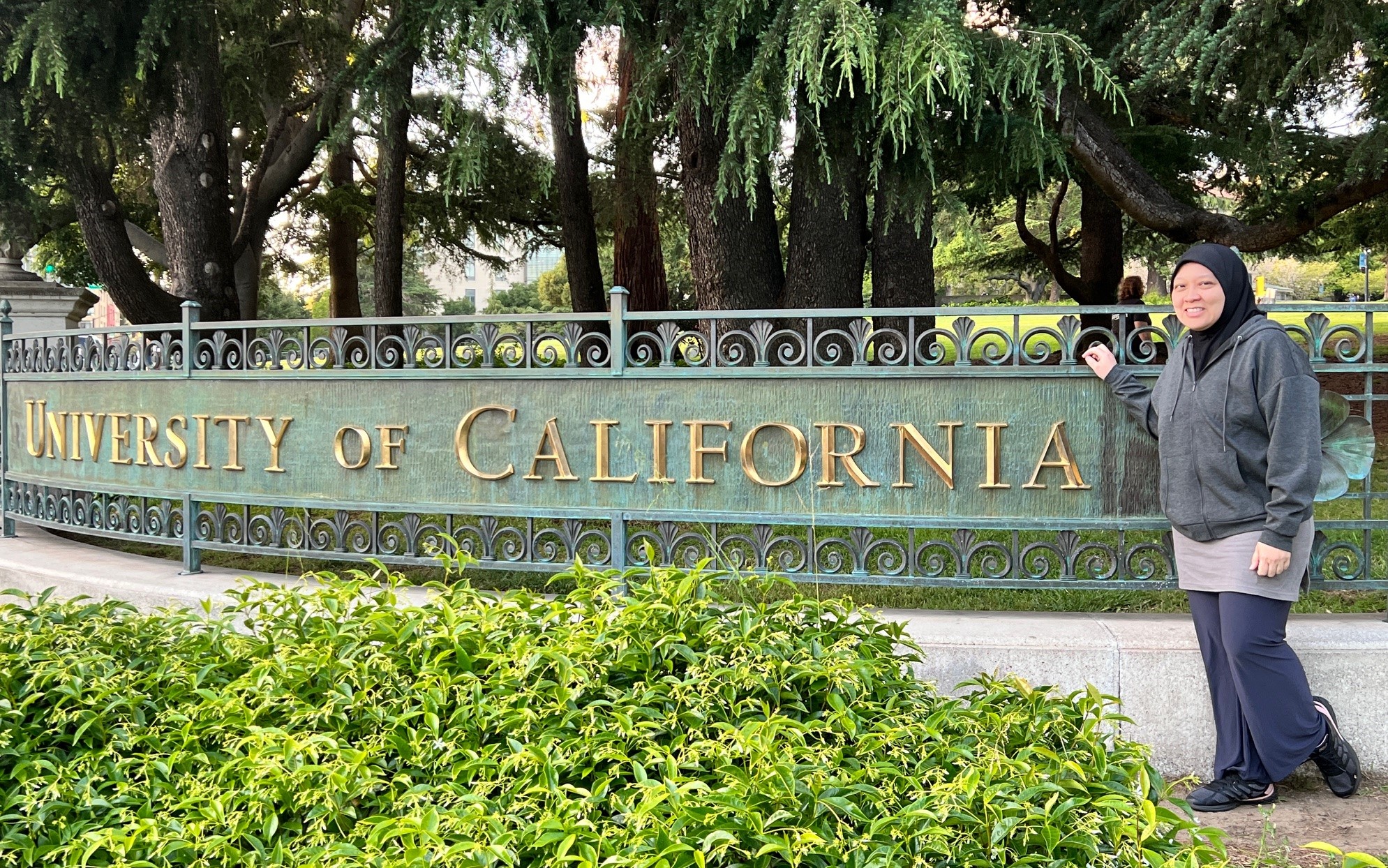[ALUMNI-INFO TEXT="Dr Intan Azura Mokhtar (Science ’98, MPA '09) has countless academic achievements under her belt. She has also served the people as a Member of Parliament. She talks to The AlumNUS about the motto that drives her and how academia cannot be divorced from real-life application."][/ALUMNI-INFO]
 Dr Intan, pictured at Lake Tahoe.
Dr Intan, pictured at Lake Tahoe.
There are three things Dr Intan Azura Mokhtar sets out to do in life: to do well, do good, and help others to do better.
An Associate Professor in the Business, Communication and Design Cluster and Director of the Community Leadership and Social Innovation Centre (CLASIC) at the Singapore Institute of Technology, Dr Intan—who graduated from the National University of Singapore (NUS) with a degree in physics—is the epitome of a lifelong learner.
“There’s a lot to learn, even when you’ve reached the pinnacle of your career,” she told The AlumNUS. “That’s what I enjoy: I learn as I do my work and write papers, and I’m also learning from my students as well.”
Dr Intan was a Member of Parliament in the Ang Mo Kio Group Representation Constituency where she served from 2011 to 2020. She holds a Master of Science and Doctor of Philosophy in Information Studies from Nanyang Technological University’s Wee Kim Wee School of Communication and Information, and a Master of Public Administration from NUS’ Lee Kuan Yew School of Public Policy. Of all her achievements, the one she didn’t plan for was her political career, she says. She served for nine years before stepping down to focus on her family and professional development.
 Dr Intan speaks at the NUS Be A-HEAD: Inspiring Inclusion - Fostering a Culture of Respect and Diversity in the Workplace event in March 2024.
Dr Intan speaks at the NUS Be A-HEAD: Inspiring Inclusion - Fostering a Culture of Respect and Diversity in the Workplace event in March 2024.
TO LIVE IS TO LEARN
As a child, Dr Intan enjoyed studying and “did well in primary and secondary school, but not that well in junior college.” It was in junior college that she discovered she could not bring herself to dissect any animal. She then swopped her childhood dream of becoming a doctor for teaching.
Going to university ushered in a new phase for her, marked by two things. “One, now that I was out of school uniform, it became about finding that balance between independence and responsibility,” she said. “Two, I spent a lot of time with friends.” She was active in both the Malay Society and the Muslim Society.
She describes her undergraduate days as “very busy”. “I travelled to and from NUS daily; I didn’t stay in the halls of residence,” she said. “Money was tight at home, so I spent hours outside school giving tuition.” But she still has warm memories of her time in the Faculty of Science. “Physics was a small cohort, so we were very close. I still keep in touch with some of my classmates,” she shares.
University was also where she met her to-be husband, but he was not in her cohort. “He is eight years older,” said Dr Intan. “One day, he came back to campus for a Malay Society event, and that is how we met.” The couple married shortly after Dr Intan graduated. They have three children: two sons and a daughter.
Lecturers she remembers include Professor Tan Eng Chye (Science ’85), currently NUS President. “He taught me maths. He was brilliant! I hope he doesn’t remember me as a not-too-good student,” she said with a laugh. Dr Intan names Professor Oh Choo Hiap as her inspiration. “He was the quintessential physics professor, very passionate about quantum mechanics. He was so inspiring, that after graduating with a degree in physics I wanted to go to Caltech and become a nuclear physicist!” She may not have pursued that dream as family came along, but Dr Intan more than made up for it with the many academic achievements she has clocked since.
 Dr Intan visits UC Berkeley as part of her Fulbright US-ASEAN Visiting Scholar Award.
Dr Intan visits UC Berkeley as part of her Fulbright US-ASEAN Visiting Scholar Award.
PUSHING FOR SOCIAL INNOVATION
Dr Intan is the recipient of the Fulbright US-ASEAN Visiting Scholar Award 2023-2024. “The project I received the award for was for social innovation in higher education institutes (HEIs), looking at the US and ASEAN,” she explained. “The programme funded me for four months to collect data from HEIs in the US. The second part, which I am still developing, is the ASEAN leg.”
She discussed her research, which is targeted for completion by 2026: “Traditionally, universities have two missions: teaching and learning, and research and development. But increasingly, in the last two decades, a third mission has come up: community-engaged service learning. How can universities ensure that they continue to address existing and relevant social needs and challenges?”
She added that one important aspect of the project is looking at how to actually evaluate the social impact of those initiatives. “We go to university to get knowledge that’s meaningful, but we come out and work in ivory towers that have little impact,” she noted. “There cannot be a disconnect between the two.” Dr Intan’s study and research is motivated by real-life concerns and creating real social impact. “We are trying to find that continuum between academia, community, and industry.”
How is such research and thinking relevant to Singapore? Dr Intan noted the challenges the country faces: “First, we are an ageing society, and by 2030, we will be a super-aged society, as defined by the OECD: more than 21 per cent of our population will be above the age of 65.” She highlighted that Singapore has limited natural resources, so it needs to stay ahead of the curve. For example, when it comes to our human resources, how can the country make sure its workers remain skilled? And how can it address food supply issues? “Then there is climate action. As a country, we use a lot of electricity. How can we meet our target to have zero carbon emissions by 2050?”
Dr Intan underscores that these issues are not just the problem of the government. “How can academia play an active role in addressing these issues, not just publishing papers?” she asked. “Social innovation is looking at application; it’s not just about blue-sky research.”
 Dr Intan at UC Berkeley.
Dr Intan at UC Berkeley.
REAL-LIFE APPLICATION
Of the many research projects under her belt, Dr Intan shares two that she holds dear. The first was her PhD project in 2008 on information literacy, making it easy for the public to verify information. At inception, it did not garner much interest, but 10 years later, the National Library Board launched S.U.R.E., a campaign that applied the principles of her research.
The second project she spearheaded was Project Kampong Lorong Buangkok, an SIT project featuring the last remaining kampong in mainland Singapore which is earmarked for a bidirectional highway and a public park in the future. Dr Intan recognised the importance of capturing the history of the kampong. “My team and I in SIT thought, ‘Okay, the day will come when the kampong will no longer be around. How can we retain the memory, the story of the kampong? The team interviewed half the residents of the kampong and documented their stories into a book. It also did VR documentation of the whole kampong.”
Right now, she believes, the kampong is an attraction for tourists, local and foreign — which is not an ideal situation for the residents. “They feel like zoo exhibits,” she says. “Instead, you can do a virtual walkthrough with VR goggles. You can visit some of the homes that way.”
She added “These are the two projects I would say I’m quite proud of, because there is some impact, and it raises possibilities for the future. I hope my current project will be able to generate that as well.”
 Then-Provost Professor Tan Eng Chye (rights) presents Dr Intan with the Outstanding Young Alumni Award in 2015.
Then-Provost Professor Tan Eng Chye (rights) presents Dr Intan with the Outstanding Young Alumni Award in 2015.
RAISING WOMEN UP
In 2015, Dr Intan was presented the Outstanding Young Alumni Award by NUS. “They roped me into the advisory committee after that,” she said with a laugh. Dr Intan served as a member of the NUS Alumni Advisory Board from July 2018 to June 2024.
In 2021, she saw the opportunity to spearhead WoW In Conversation, a series of events that highlighted women who “could be seen as role models”. The series has since ended. “WoW stands for ‘women of wisdom, wonder, and wit,” she smiles. “Sometimes, women need to lift other women."
“I wanted to create a platform to inspire other young women,” she shared. “We shouldn’t be uncomfortable having tough conversations — for example, only one out of six Presidents of autonomous universities in Singapore is a woman.” As a woman in STEM, she would like to see more females in this sector. “We’re doing much more in terms of diversity and inclusion now than 30, 40 years ago, but we still have some way to go.” [ALUMNI-QUOTES TEXT="“We’re doing much more in terms of diversity and inclusion now than 30, 40 years ago, but we still have some way to go.”"][/ALUMNI-QUOTES]
Academic, researcher, champion of women, problem solver, thinker, mother, wife. And Dr Intan isn’t even close to slowing down in her achievements, teaching, and learning. “We do what we can in life, because at the end of the day, before we leave this earth, I want to be able to look back and say ‘What have I done?’ Three things: do well, do good, and help others do better,” she concluded.
This article was first published on
The AlumNUS on 10 Dec 2024.